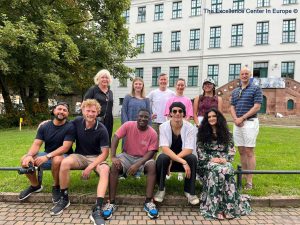Angela Merkel stunned the world in September 2015, when she opened German borders and allowed hundreds of thousands of refugees to enter the country. Three years after their arrival, how successfully have refugees to Germany integrated?
More than 1.3 million people have sought refuge in Germany over the past three years. Refugees to Germany have come to escape war and internal conflicts in their own countries. Germany has offered a safe haven from the misery interjected into the lives of these people.

Due to their displacement, refugees have faced many challenges in their travels to safety, such as vulnerability to the smugglers’ conditions, as well as passage through waters in ships lacking the most basic safety features. The deaths of many refugees have occurred due to dangerous conditions, and many others’ lives have been endangered.
Refugees from many different languages, cultures and traditions have come to Germany to encounter the German and Western cultures. Refugees who settle in German states must learn German and integrate into German society.
The German government has made major efforts in order to integrate refugees. Some important efforts have been made by offering free language courses, and programs that provide training for refugees so that they can pursue employment opportunities. Despite all these policies and procedures developed by government decision-makers, Germany is not ready to accommodate this large number of refugees.

The Eastern states of Germany are known to be less welcoming to foreigners than the Western states. Northern Rhine-Westphalia, with its population of 17.5 million souls, is larger than all the Eastern states in terms of population. More than half a million people of Turkish origin reside in Rhine-Westphalia making it an attractive choice for some refugees.
Many people believe that the Eastern states are populated by right-extremists. In contrast, there is a much longer history of immigration in the former West Germany, so that some Syrians prefer to settle there. At the same time, a refugee who travels to the city of Bochum (in Northern Rhine), is able to do everything in Arabic, even as the refugee learns German, which means that the refugee can settle and integrate easier.
What Challenges do Refugees Face?
Learning German is one of the biggest challenges faced by refugees once they arrive in Germany. Refugees receive language lessons in “welcome classes”. Special attention is given to young refugees who learn languages faster and easier than their elders. These youths receive intensive German language lessons that are conducted in separate classes from their German counterparts within the same schools.
Despite speaking enough language to communicate, many refugees face problems of acclimatization and integration into society. Veiled women wearing the hijab often face racist attitudes in some states in Germany. Undoubtedly the situation is much better than the Fall of 2015, but refugees continue to face many challenges, especially since many of them do not have a stable legal status which limits their ability to work and receive assistance.
How are Asylum Seekers viewed by Social Workers and other Decision-makers?
Social leader Jonas believes that the lack of public debate concerning refugees hampers their integration. Jonas says that the correct conversation has not been addressed. Many asylum advisers view Germany as a way forward in the lives of refugees, regardless whether people want to hear it or not, these advisers aver that Germany has always been an immigrant country.
Many refugees have come to Germany without their families, and, therefore, have faced many challenges themselves besides learning the German language; some may be seeking to bring their families to Germany by pursuing long-term reunification procedures that take a year or two to complete. This lengthy process puts a refugee under additional stress and fatigue on top of the personal assimilation and integration processes.
Although Germany has hosted nearly one million refugees over the past five years, refugees still face various challenges in language learning, housing, employment, and legal status as refugees in Germany.



